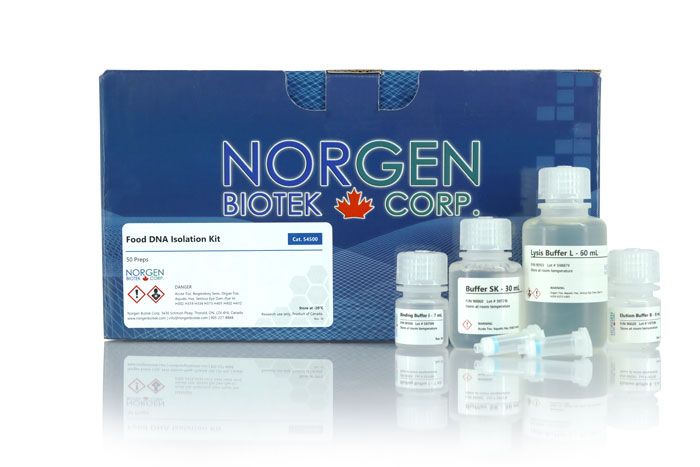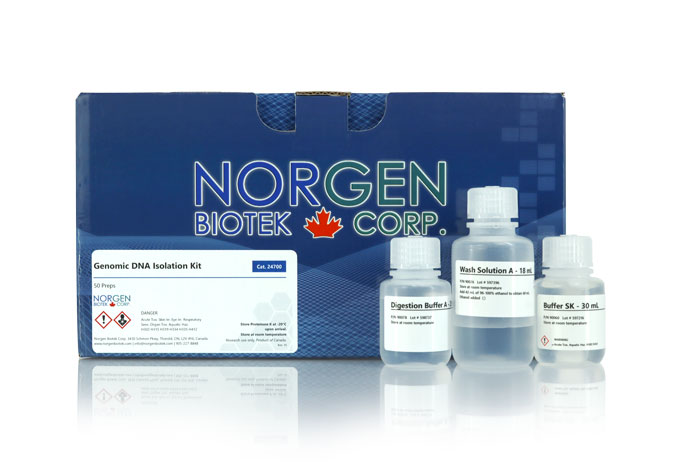Food DNA Isolation Kit
For the isolation of DNA directly from food or from enriched microorganisms

For research use only and NOT intended for in vitro diagnostics.
Food DNA Isolation Kit
For the isolation of DNA directly from food or from enriched microorganisms
Register today to receive an exclusive 15% off* on your first order.
Features and Benefits
- Isolate DNA from a wide range of food materials. (e.g boiled, fluid, processed or raw food products)
- No hazardous chemicals required (e.g. phenol or chloroform)
- Effective lysis with Proteinase K and optional lysozyme treatment
- Fast (less than 15 minutes hands-on time) and convenient processing using a rapid spin-column format
- Wide compatibility with a variety of food products for GMO-DNA isolation
- Universal protocol for food related pathogen DNA isolation (Gram positive and Gram negative)
This kit provides a rapid spin column method for the isolation and purification of total DNA from a wide range of food samples originating from animals or plants. The kit is designed for identification of GMO-DNA or animal components in food and feed and can be used for a wide range of starting materials including raw or processed food, meat, liquids, sauces and dairy products including milk, cheese and yogurt.
This kit also provides a convenient method for the detection of food-related pathogens and will isolate such DNA (enriched or as is) including Gram-positive bacteria, Gram-negative bacteria, yeast and fungi which may contaminate food sources. A number of pathogens have been tested including E. coli O157:H7, Staphylococcus, Listeria monocytogenes, Salmonella enterica & Campylobacter jejuni. The purified DNA is of the highest integrity, and can be used in a number of downstream applications including PCR based detection, sequencing and genotyping.
Details
Supporting Data
Figure 1. Isolate DNA from a Wide Range of Food Samples. Total genomic DNA was isolated from 200 mg of processed (chicken soup, beef jerky) or non-processed (raw pork, olive dressing, ground beef) food materials using Norgen's Food DNA Isolation kit. Following isolation, 10 µL from each 100 µL elution was loaded on 1% TAE agarose gel. Lane M: Norgen's HighRanger 1kb DNA Ladder.
Figure 2. High Purity of DNA Samples. DNA was isolated from 200 mg of processed (chicken soup, beef jerky) or non-processed (raw pork, olive dressing, ground beef) food materials using Norgen's Food DNA Isolation Kit. DNA purity was then determined using a NanoDrop. All the DNA isolated from the different food samples showed a high quality (260/280=1.9-2.1).
Figure 3. High Quality DNA free from PCR Inhibitors - Superior Quality to detect two house keeping genes (5S rDNA and 16S rDNA) representing GMO gene and food related pathogen detection. Total DNA was isolated from 200 mg samples of different food materials (processed and non-processed) using Norgen's Food DNA Isolation Kit. Next, 4 µL of the elution was then used as the template in 20 µL PCR reactions using universal 5s rDNA primers (A) and prokaryotic 16s rDNA primers (B) in real-time PCR (SYBR Green). Norgen's DNA was successfully amplified, indicating the high quality of the inhibitor-free DNA for GMO and pathogen detection from diversified food materials.
|
Kit Specifications
|
|
|
Maximum Column Binding Capacity
|
50 μg
|
|
Maximum Column Loading Volume
|
650 μL
|
| Maximum Amount of Starting Material: Solid food material Liquid sample (e.g. milk or concentrated juice) |
200 mg 1 mL to 1.5 mL |
| Time to Complete 10 Purifications |
45 minutes
|
Storage Conditions and Product Stability
All solutions should be kept tightly sealed and stored at room temperature. This kit is stable for 1 year after the date of shipment. The kit contains a ready-to-use Proteinase K, which is dissolved in a specially prepared storage buffer. The buffered Proteinase K is stable for up to 1 year after the date of shipment when stored at room temperature.
Samples Tested by PCR
| Food Materials | Samples that Have Been Tested by PCR |
|
Plant related
|
Cereal, Jam, Chocolate, Spices, Sauce |
|
Animal related
|
Raw and processed meat products (e.g. ham, beef jerky, taco seasoned ground beef, pork and sausage) |
|
Dairy product
|
Milk, Yogurt, Cheese |
|
Pathogens (enriched from food samples) |
E. coli O157:H7 from food sample Staphylococcus from milk Listeria monocytogenes from milk Salmonella enterica from raw meat Campylobacter jejuni from milk |
Component | Cat. 54500 (50 preps) |
|---|---|
Lysis Buffer L | 60 mL |
Binding Buffer I | 7 mL |
Buffer SK | 30 mL |
Wash Solution A | 18 mL |
Elution Buffer B | 8 mL |
Proteinase K | 1 vial |
Spin Columns | 50 |
Collection Tubes | 50 |
Elution Tubes (1.7 mL) | 50 |
Product Insert | 1 |
Documentation
FAQs
Spin Column
Poor DNA recovery could be due to one or more of the following:
- Column has become clogged.
Do not exceed the recommended amounts of starting materials. The amount of starting material may need to be decreased if the column shows clogging below the recommended levels. See FAQ related to “Clogged Columns/wells” below.
- An alternative elution buffer was used.
It is recommended that the Elution Buffer B supplied with this kit be used for maximum DNA recovery.
- 70% Ethanol was not added to the lysate.
Ensure that an equal amount of 70% ethanol is added to the lysate before binding to the column.
- Ethanol was not added to the Wash Solution A.
Ensure the indicated 96 - 100% ethanol amount is added to the supplied Wash Solution A prior to use.
Column clogging can result from the following:
- Maximum amount of food material exceeds kit specifications.
The optimal input is 200 mg of food material. However, for some food materials, 50-100 mg may be processed depending on the sample type.
- Centrifuge temperature is too low.
Ensure that the centrifuge remains at room temperature throughout the procedure. Temperatures below 20℃ may cause precipitates to form that can cause the columns to clog.
If the DNA does not perform well in downstream applications, it may be due to one or more of the following:
- PCR reaction condition needs to be optimized.
Take steps to optimize the PCR conditions being used, including varying the amount of DNA template, changing the source of Taq polymerase, looking into the primer design, and adjusting the annealing condition.
- Binding Buffer I was not added to the lysate.
Ensure that the Binding Buffer I is added to the lysate and that it is incubated on ice for 5 minutes prior to spinning down the lysate.
- DNA was not washed with the provided solutions.
Traces of salt from the binding step may remain in the sample, and salt may interfere with downstream applications. Repeat Step 3c with 500 µL of Wash Solution A.
- Ethanol carryover.
Ensure that the dry spin under the Column Wash procedure is performed in order to remove traces of ethanol prior to elution. Ethanol is known to interfere with many downstream applications.
Yes, you can purchase more Proteinase K, and it is supplied in a pack size of 5 x 1 mL tubes. Please contact us and request for Product number 28229.

